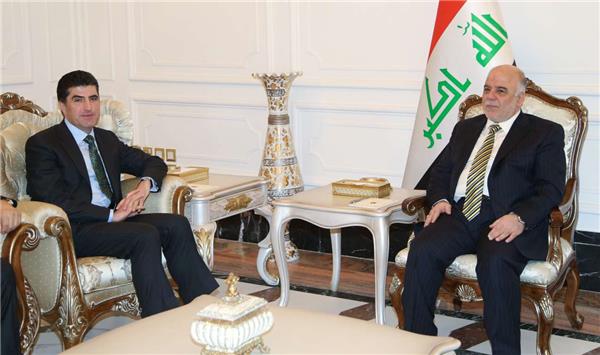
In a far-reaching deal with the potential to unite Iraq in the face of a Sunni insurgency, the government of Prime Minister Haider al-Abadi agreed on Tuesday to a long-term pact with the autonomous Kurdish region over how to divide the country’s oil wealth and cooperate on fighting the extremists of the Islamic State.
The deal unites Baghdad and Erbil, the Kurdish capital in the north, over the issue of oil revenues and budget payments, and is likely to halt a drive — at least in the short term — by the Kurds for an independent state. The deal includes payments from the central government for the salaries of Kurdish security forces, known as the pesh merga, and also will allow the flow of weapons from the United States to the Kurds, with the government in Baghdad as intermediary.
“Now the priority really is to confront ISIS,” Hoshyar Zebari, Iraq’s finance minister, said in an interview Tuesday after emerging from a cabinet meeting in which the deal was finalized after several days of talks, using an acronym for the Islamic State.
Iraq’s central government and its Kurdish minority had long been at an impasse over how to share oil revenue, an issue that had threatened to tear the country apart. In reaching a deal, Mr. Abadi, who has been prime minister for less than three months, has shown himself to be a very different leader from his predecessor, Nuri Kamal al-Maliki, who had alienated the Kurds — and the Sunni Arab minority — with his confrontational personality and policies that were seen as excluding minority communities from a role in Iraq’s affairs.
“The new team, under Abadi, is a cooperative team, a positive team,” said Mr. Zebari, who is a Kurd and who was Iraq’s foreign minister in the Maliki government.
The deal, which put a final imprimatur on a temporary pact that was agreed to three weeks ago, also represented a significant victory for the United States, which has made a priority of pushing the Kurds and the central government to settle their political and economic differences. American officials had expressed fear that if the two parties did not reach some sort of arrangement the country would break up, with the Kurds pushing forward on longstanding ambitions for independence. For now, the deal appears to remove the prospect of near-term independence for the Kurds, who already enjoy a great measure of autonomy.
The rapprochement between Baghdad and the autonomous Kurdish region also appeared to validate one element of President Obama’s strategy in confronting the Islamic State: pushing for a new, more inclusive leader of Iraq. When the extremists swept into Mosul, Iraq’s second largest city, in June, Mr. Obama decided that Mr. Maliki had to go before the United States would ramp up its military efforts against the Islamic State.
After protracted negotiations and high political drama over the summer, with both the United States and Iran playing key roles, Mr. Maliki was replaced by Mr. Abadi, seen as a more cooperative figure than Mr. Maliki even though he is from the same Shiite Islamist political party, Dawa.
So far, Mr. Abadi has proved to be a much more inclusive figure than Mr. Maliki, in both style and substance. He has removed corrupt officials and military officers who were seen as loyalists to Mr. Maliki, has reached out to Sunni Arab countries such as Saudi Arabia that have historically been hostile to the Shiite-led government here, and even reduced his own salary and those of his ministers, in a bow to public anger over the compensation for lawmakers. But by far his biggest victory so far is the deal with the Kurds.
His office released a statement on Tuesday – Mr. Abadi himself had flown to Belgium for a meeting with officials from countries involved in the American-led coalition against the Islamic State – that underscored the simple agreement that was at the heart of the complicated negotiations: “that Iraqi oil belongs to all Iraqis.”
Under the deal, the Kurdistan region will provide 550,000 barrels of oil per day that will be sold through government channels, and divided between Baghdad and Erbil. This includes 300,000 barrels per day from the disputed region of Kirkuk, which the Kurds took control over in June after the onslaught by the Islamic State forced the retreat of the Iraqi army.
The pact also stipulates that Baghdad will permanently resume payments to the region – which had been halted under Mr. Maliki amid the dispute – that amount to 17 percent of the national budget, plus another $1 billion to pay for salaries and weapons for the pesh merga, which are on the front lines fighting ISIS, sometimes with Iraqi security forces and Shiite militias.
In a news conference in Baghdad on Tuesday Nechirvan Barzani, the Kurdish region’s prime minister, alluded to the tensions of the Maliki era and praised Mr. Abadi.
“Abadi’s desire to reach an agreement was motivational,” he said. “We hope to turn this in to a new chapter in the relations between Baghdad and Erbil, and we never accepted the threatening tone which was commonly used before.”
Mr. Maliki, meanwhile, is now a vice president, one of three in Iraq and a largely ceremonial position, and has worked to undermine Mr. Abadi, speaking publicly against an oil deal with the Kurds.
NY Times

Leave a Reply
You must be logged in to post a comment.